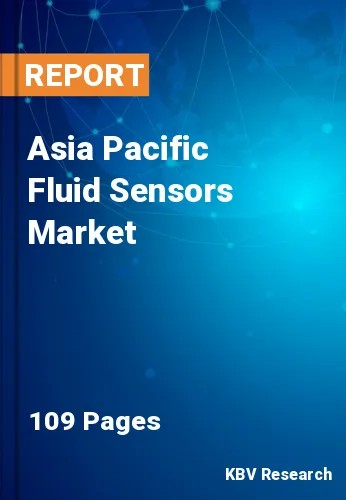The Asia Pacific Fluid Sensors Market would witness market growth of 7.3% CAGR during the forecast period (2022-2028).
These sensors contain a low-energy ultrasonic gadget that measures fluid pressure at a specific place. Contact ultrasonic level sensors contain no moving components and do not require calibration. They consist of a field-mounted sensor and an inbuilt solid-state amplifier. They usually have terminal blocks for connecting to a power source and outer control devices. When the gap in the sensor contains fluid, the ultrasonic signal passes it and controls relay switches. For horizontally installed sensors, the detecting level is halfway along the gap; for vertically mounted sensors, it is at the top of the gap.
These level sensors are used to automatically activate pumps, solenoid valves, and high/low alarms in vessels or pipes. Filling and emptying tanks, as well as metering fluid volumes, would necessitate two people. Coatings, adhering droplets, foam, and mist do not affect them, and they are compatible with most fluids. Highly aerated fluids and fluids thick enough to block the sensor gap, on the other hand, may pose issues.
Three pressure-temperature sensors and two fluid-sample sensors were deployed in an array of eight short-period borehole geophones in the Pembina oil field in Alberta, Canada, with the goal of identifying stimulated micro-seismicity affiliated with CO2 activity, which includes injection, within a natural reservoir. The major goal was to look at possible CO2-induced seismic signals over a two-week period, which coincided with a significant CO2 and CH4 leakage.
This region is home to manufacturing facilities for a variety of enterprises in several industrial verticals, such as automotive, which is generating demand for various components utilized in the production of a wide range of automotive and consumer electronics products. Furthermore, rising consumer disposable income is boosting demand for electronic devices, which would help the fluid sensors market grow even faster.
The China market dominated the Asia Pacific Fluid Sensors Market by Country in 2021, and would continue to be a dominant market till 2028; thereby, achieving a market value of $2,042.2 Million by 2028. The Japan market is experiencing a CAGR of 6.7% during (2022 - 2028). Additionally, The India market would exhibit a CAGR of 8% during (2022 - 2028).
Based on Type, the market is segmented into Flow Sensor and Level Sensor. Based on Technology, the market is segmented into Non-contact and Contact. Based on End-user, the market is segmented into Power & Utilities, Automotive, Oil & Gas, Water & Wastewater, Food & Beverages, Chemical, and Others. Based on countries, the market is segmented into China, Japan, India, South Korea, Singapore, Malaysia, and Rest of Asia Pacific.
Free Valuable Insights: The Worldwide Fluid Sensors Market is Projected to reach USD 20.2 Billion by 2028, at a CAGR of 6.9%
The market research report covers the analysis of key stake holders of the market. Key companies profiled in the report include ABB Group, Schneider Electric SE, Sick AG, Robert Bosch GmbH, Texas Instruments, Inc., NXP Semiconductors N.V., Siemens AG, Honeywell International, Inc., Emerson Electric Co., and Rockwell Automation, Inc.
By Type
By Technology
By End User
By Country
Our team of dedicated experts can provide you with attractive expansion opportunities for your business.

